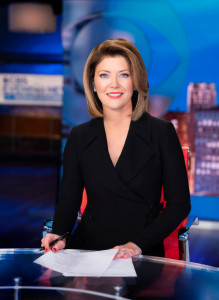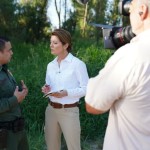Three mass shootings and the heart-wrenching soul searching and calls for stricter gun laws in their aftermath. The shocking jailhouse suicide of a notorious sexual predator. A seemingly never-ending flow of incendiary tweets from the president. The jockeying of Democratic presidential candidates during their nationally televised debates.
These are just some of the stories that have broken under the watch of Norah O’Donnell in her new job as anchor and managing editor of the “CBS Evening News.” During this time, the half-hour broadcast has also featured a number of exclusive reports and original stories on topics including the so-called “cancer alley” in Louisiana and a look inside a detention center where unaccompanied migrant children can be detained indefinitely.
O’Donnell took the reins July 15, becoming only the third woman to solo-anchor a broadcast network evening newscast. Preceding her, Diane Sawyer at ABC (2009-2014) and from 2006-2011, Katie Couric at CBS, the home of legendary broadcast journalists Edward R. Murrow and Walter Cronkite.
The anchor, who took over the desk from Jeff Glor, brings her own journalistic history to the post, including a dozen years at NBC News, a long stint on “CBS This Morning” and as chief White House correspondent for the network.
During her more than 20 years as a journalist, O’Donnell has covered six presidential elections and traveled the globe—to every continent except Antarctica–and interviewed some of the world’s most powerful leaders, including six of the last seven U.S. presidents.
Her passport got stamped at an early age. Growing up in a military family, O’Donnell lived in Landstuhl, Germany, Seoul, South Korea and in San Antonio, Texas. She now resides in New York and in Washington, D.C. with her husband, restaurateur Geoff Tracy, and their three children. While the newscast emanates from the CBS Broadcast Center in New York, it will relocate to the nation’s capital this fall.
On her first broadcast, O’Donnell herself made news—as the only newscaster to term President Trump’s now infamous tweets about sending four Democratic congresswomen “back where they came from” as racist.
It was a momentous first week, which included marking the 50th anniversary of the Apollo 11 lunar landing to visiting a migrant detention center on the Texas-Mexico border and appearing on “The Late Show with Stephen Colbert.”
O’Donnell told the late-night host that as a young girl she revered Barbara Walters, who made history in 1976 by co-anchoring the “ABC Evening News” with Harry Reasoner, the first female to appear in such a role.
She then gamely read some of Colbert’s suggested—but ultimately rejected—sign-offs for her newscast. Among them: “Good night and good luck with all that” and “That is the CBS Evening News. Now, I need a drink.”
In an email interview with me this week, O’Donnell spoke about her role continuing the “CBS Evening News” legacy, the changes the #MeToo era has wrought in television news and her outlook on covering the 2020 election.
People talk about the downslide of network evening newscasts – and the ratings battle that goes on amongst them –but the fact is that millions of people still tune in. How do you see the future of “CBS Evening News” and your role in it?
The evening broadcasts are incredibly vital. In total, more than 20 million people watch one of the three network evening newscasts every night. That’s a significant audience. The audience is also finding us on other platforms as well, including on CBSN, our 24/7 streaming news service. The “CBS Evening News” streams live in its entirety on CBSN every night at 10:00 PM, ET. The “CBS Evening News” is really a 24/7 brand. It is on television, of course, but on many other screens, too. I think it’s important to be available wherever the audience is, and we will continue to evolve and do whatever we can to find new audiences wherever they are.
Obviously the past few years have been a time of great turmoil at your network, with Les Moonves, Charlie Rose and Jeff Fager removed from power after allegations of sexual misconduct. What changes in corporate culture or workplace relations have you seen as a result of the #MeToo movement?
At the time, I made a very clear statement I hoped would stand the test of time, and I think it’s still true today: Women cannot achieve equality in the workplace until there’s a reckoning and a taking of responsibility. But I think we’re in the middle of an incredible moment – I’m so optimistic about the changes I’m seeing, and I really do believe this will be the century of women. Our new president and senior executive producer, Susan Zirinsky, is the most inspirational and transformational leader I have ever worked for. Leadership matters, and she is setting the right tone for the entire organization by establishing a culture of inclusivity and compassion and a culture of winning.
With your experience as chief White House correspondent for CBS News, how do you see the upcoming election?
The 2020 election is the most consequential election of my lifetime, and I’ve covered six presidential elections. This struck me after I spoke with a top U.S. intelligence official who called this upcoming election the “Super Bowl” of all elections. China and Iran have joined Russia as foreign actors who are trying to influence our democratic process. It’s an extraordinary time to be covering politics, and it’s more important than ever that we get the facts right.
Your evening newscast is moving from New York to Washington, D.C. Tell us about that move and how it will impact political coverage, particularly of the 2020 presidential election.
The United States is the most powerful country in the world. Washington is the world’s most powerful capital. I’m a firm believer that in order to cover a story well, you have to get as close to it as you can. That’s really the driving force behind the move to Washington: every story has a nexus there. Every decision that is made there affects everyone in this country – whether it’s health care, tariffs, national security. The “CBS Evening News” will not be a Washington-centric broadcast, but we will use our location to better cover the stories happening across the globe. I’m a reporter at heart, and I think being in Washington will give our entire team an edge on covering the 2020 campaign and beyond.
You quoted Edward R. Murrow at the end of your first broadcast. What was the philosophy behind that? And what does carrying on the larger legacy of CBS News mean to you?
There’s a great legacy here at CBS News of the finest journalists. One of them was Edward R. Murrow, who eloquently captured the power of television when he said: “This instrument can teach, it can illuminate; yes, and even it can inspire.” He went on to say that TV can be more than “wires and lights in a box.” He said, “There is a great and perhaps decisive battle to be fought against ignorance, intolerance and indifference. This weapon of television could be useful.” Murrow delivered that famous speech in 1958, but the sentiment is just as important today as the role and freedom of the press is vital.
Let’s talk about CBS’s coverage of the 50th anniversary of Apollo 11 in July. Did you feel the presence of Walter Cronkite and his inimitable role in the space program when you anchored from the Kennedy Space Center?
One of my favorite pieces from our first week on the air was a historical deep dive into CBS News’ coverage of the Apollo 11 launch. More than half a billion people watched the moon landing, and the vast majority in the U.S. were tuned to CBS. Walter Cronkite’s coverage is the broadcast of record – he was on the air for an unprecedented 46 hours of live television. Going back and re-visiting that coverage and anchoring from the Kennedy Space Center was an incredible way to begin. The whole team was especially proud of our “Women of the Apollo” interviews that featured the program’s hidden figures.
As you are only the third woman to solo anchor a weekday evening newscast, how does this impact your thoughts on mentoring or promoting other women and underserved voices in the industry—or being a role model?
I really do believe this will be the century of women. One of the things I’ve come to learn is that it does matter who is telling the story and who decides what stories we cover. I feel a huge responsibility in this role, and I hope I’m able to use this platform to guide coverage that is reflective of the whole of America.
What feedback or support have you received from colleagues who may be competitors in the news business or veteran broadcasters? Have other anchors like Barbara Walters, Diane Sawyer and Katie Couric offered words of wisdom?
One of the first people I heard from after I was named anchor and managing editor was Maureen Orth, Tim Russert’s widow. I worked with Tim when I was at NBC and he had such a big impact on my career. Maureen wrote “Tim would be so proud.” That brought me to tears. I also received beautiful notes from Barbara Walters, Diane Sawyer, Katie Couric, Dan Rather, Tom Brokaw and David Muir – journalists who’ve held similar positions and remember the privilege and pressure of this role.
Although it’s clearly been a whirlwind five weeks, including your first-week interviews with Caroline Kennedy and Jeff Bezos and appearing on Colbert, what have been the highlights at the anchor desk for you? By the way, I liked some of his suggested sign-offs…
I loved those “suggested sign-offs,” too! Colbert is brilliant!
One of the most important stories we’ve covered since launching this broadcast is the crisis at the border. On our third day, we visited McAllen, Texas. The “CBS Evening News” had the first cameras allowed inside the nation’s largest migrant processing center. Acting DHS Secretary McAleenan said he was taking a risk to let us in. And it was so important for us to do that reporting and show the American people what was actually going on in this processing center – to really put the onus on our elected officials to address the situation at the border.
Aside from the obvious time shift, what adjustments have you made moving from morning news to evening?
“CBS This Morning” is still must-see TV, but I have to say it feels nice to “sleep in” until 5 a.m., read the papers, have coffee with my husband and breakfast with my kids before they go to school. We haven’t been able to do that for the last seven years, and it’s wonderful to have that family time now – especially as the kids are getting older.



